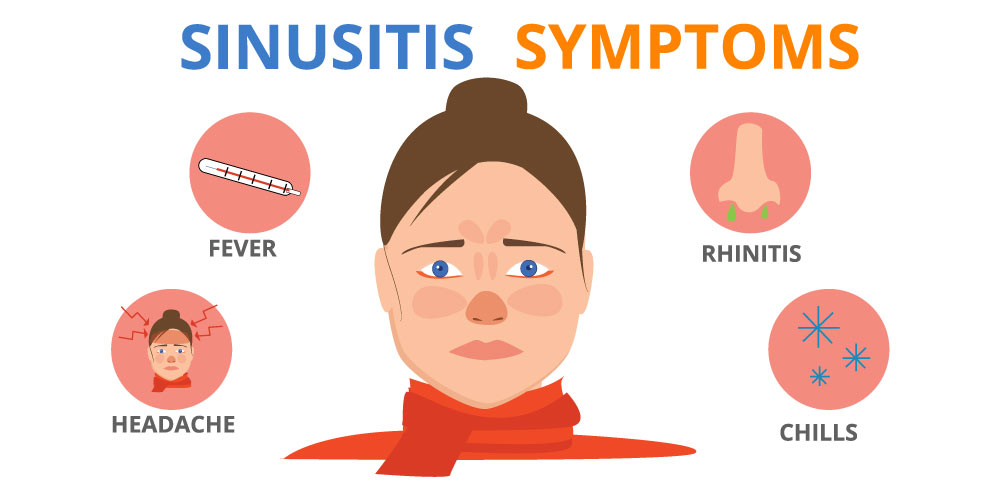Sinusitis is the inflammation of the sinuses and is often caused by bacterial, fungal, or viral infection. People who have previous allergies or a weak immune system are more likely to develop a bacterial or fungal sinus infection. A sinus infection interrupts the normal flow of the mucus from the sinuses to the back of your throat. Acute sinus infection typically lasts 3 to 8 weeks. A sinus infection that lasts longer than 8 weeks is considered chronic.
A sinus infection or sinusitis is one of the most common health problems that can occur after a cold, flu, or allergy attack. In fact, sinusitis is a very common condition. It can be difficult to realize if your common cold has turned into a sinus infection. But, some key indications of sinusitis include pain and facial pressure, thick green or yellow mucus, etc.
How do I Know If I Have Sinusitis?
The hallmark signs and symptoms of a sinus infection or sinusitis, whether acute or chronic, are-
- Nasal congestion and stuffy nose
- Thick nasal discharge which may be yellow or green in color
- Decreased or no sense of smell
- Facial pressure, tenderness, and pain
- Swollen sinuses
- Postnasal drip ( mucus dripping down the back of your throat)
- Headache
- Toothache
- Bad breath
- Fatigue
- Fever higher than 38 degrees Celsius
- Cough and sore throat
- Ear pressure
If you are having such symptoms, you may have sinusitis and you should get yourself checked by an ENT doctor. Book your appointment with our ENT specialist and discuss your symptoms with them.
What Causes Sinus Infection?

Sinusitis or sinus infection is usually caused due to a cold or flu virus that has spread to the sinuses from the upper airways. A tooth infection or fungal infection may also occasionally cause the sinuses to become inflamed and cause sinusitis.
It is exactly not clear what causes sinus infection or what factors cause the sinusitis to become chronic, but factors that can cause chronic sinusitis usually include-
- Allergies and related conditions, such as allergic rhinitis, asthma and hay fever
- Smoking
- A weakened immune system
- Nasal polyps
- Deviated nasal septum
- Respiratory tract infections
- Other medical conditions such as cystic fibrosis, HIV
Individuals with underlying health conditions such as allergies and asthma should make sure that their conditions are well controlled to prevent and improve chronic sinusitis.
What Are the Types of Sinusitis?
The condition of sinus infection is classified by how long the sinusitis lasts.
- Acute sinusitis may last for about 30 days or less
- Subacute sinusitis may last for 1 to 3 months
- Chronic sinusitis may last for more than that 3 months or even years.
- Recurrent sinusitis may last for 4 or more sinus infections in a year
To decide the suitable treatment and long-time approach for sinusitis, the ENT doctor will do a thorough diagnosis including a physical exam. The doctor will also ask you questions about your symptoms, their severity and how often they show up. Medications are helpful for patients with mild symptoms of sinusitis. But for severe and more frequent sinusitis, medications may prove unsuccessful and the doctor may recommend surgery for relief.
How Long Does the Sinus Infection Last?
Acute sinusitis, if caused by a viral infection, may cause inflammation and symptoms that usually develop quickly and last for 7 to 10 days. But the sinusitis can last for about 4 weeks if it is caused by a bacterial infection. Chronic sinusitis may last for 12 weeks or more and can continue for several months or years. People often describe chronic sinusitis as a never-ending cold. But having symptoms of sinusitis does not always mean that you have a sinus infection. Symptoms of allergies, flu and cold are often misunderstood as sinusitis. So, if you are having symptoms of sinusitis, you should get it checked by an ENT doctor.
Indications that you should visit an ENT doctor for sinus infection
You should see an ENT doctor for sinusitis if your symptoms last more than 10 days and you have had several episodes of sinusitis in the past. You should also consult an ENT specialist if medicines do not relieve your symptoms anymore. Indications that you should visit an ENT doctor immediately are-
- A persistent fever
- Changes in vision, including blurry or double vision
- Symptoms that are not relieved with medicines
- Frequent episodes of sinus infections with severe symptoms
- Sudden, severe pain and pressure in the face or head
- Swelling and redness around the eyes
- Stiffness in neck
After a thorough diagnosis, the ENT doctor will determine what is causing the sinus infection. Some cases of sinus infections, which are caused by bacterial infections can be treated with antibiotics. If medications are not effective or your symptoms continue to get worse, notify your doctor, who may ask you to visit for a follow-up appointment.
Patients who are unable to get relief even after trying various non-surgical treatments for sinusitis, surgery should be considered. In simple words, if non-surgical treatments are not providing any relief, surgery might be necessary to treat sinusitis. Surgery to treat chronic sinusitis is called FESS or functional endoscopic sinus surgery. FESS is carried out under general or local anesthetic and is a daycare procedure with no downtime post surgery. The patient would be fit to resume regular life and office routine 2 to 3 days after the procedure.
If you have been suffering from sinusitis for a long time and are unable to find a solution, FESS might be your answer. Give us a call to discuss with our medical coordinator if you should undergo FESS and how this surgery can benefit you.


